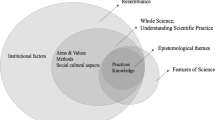
Overview
- Provides a valuable approach for teaching Science Education in the 21st century
- Seeks simplicity within the complexity of teaching major science-related issues
- Presents contemporary science education research seeking to grapple with complexity.
Access this book
Tax calculation will be finalised at checkout
Other ways to access
About this book
This edited volume brings together a broad range of international science education studies, focusing on the interplay of teaching and learning science. It recognizes the complexity present in today’s education, associated with major science related issues faced by society, such as climate change, diseases and pandemics, global conflicts over energy, food and water.
The studies discussed in this volume are focused on presenting different opportunities to teach these convoluted matters in order to find simplicity within the complexity and make it accessible to learners. They bring together the challenges of preparing the students of today to become scientifically informed citizens of tomorrow.
Similar content being viewed by others
Keywords
- Science Education
- STEM education
- science educators
- Science Teaching
- Environmental education
- challenges for educators
- Physics Students in Madrasah
- Culture-Based Science Literacy
- Supporting Early-Career Science Teachers
- Problem Based Learning in science
- climate change education
- Teaching Electricity Using Representational Pedagogies
- teaching out-of-field science
- History and philosophy of chemistry education
- wicked problems
- Learning science
- preparing tomorrows citizens
Table of contents (13 chapters)
-
Front Matter
-
Exploring the Broader Social Complexities of Science Education
-
Front Matter
-
-
Perceptions, Teaching and Learning of Socio-scientific Issues in Diverse School Contexts
-
Front Matter
-
-
Exploring the Development of Scientific Literacy
-
Front Matter
-
-
Making the Complexities of Science Curriculum Content and Concepts Accessible to Learners
-
Front Matter
-
-
Back Matter
Editors and Affiliations
About the editors
Kim Nichols is currently an Associate Professor of science education at the University of Queensland School of Education and co-editor of Research in Science Education. Drawing on her past experiences as a National Health and Medical Research Centre funded scientist at Flinders University Centre for Neurosciences and Adelaide University Medical School, her research focuses on making the complexities of science accessible to learners through inquiry-based representational practices and collaborative reasoning. Kim’s expertise has been commissioned by the Queensland Department of Education to develop online learning modules for teachers on inquiry and representational practices in science and to work with schools in their Advancing Science Technology Engineering and Mathematics (STEM) in Primary Schools initiative. Kim currently leads an Australian Research Council funded collaborative project in partnership with the Queensland Department of Education, Queensland Museum Network, Shell QGC and Queensland regional schools to develop a multi-systemically resilient model of community-based STEM professional learning for teachers.
Christine McDonald’s research primarily focuses on how the nature of science is conceptualised by teachers and students, and represented in science education curriculum materials. She has also recently led the Australian leg of a large-scale, international study investigating students’ views of scientific inquiry, and her commissioned review of best practice in Science, Technology, Engineering and Mathematics (STEM) education underpinned the development of the Queensland Department of Education STEM Strategy. She is a past Director of the Australasian Science Education Research Association, and is currently an Associate Editor of the Journal of Research in Science Teaching (USA).
Bibliographic Information
Book Title: Complexity and Simplicity in Science Education
Editors: David Geelan, Kim Nichols, Christine V. McDonald
DOI: https://doi.org/10.1007/978-3-030-79084-4
Publisher: Springer Cham
eBook Packages: Education, Education (R0)
Copyright Information: Springer Nature Switzerland AG 2021
Hardcover ISBN: 978-3-030-79083-7Published: 26 January 2022
Softcover ISBN: 978-3-030-79086-8Published: 27 January 2023
eBook ISBN: 978-3-030-79084-4Published: 25 January 2022
Edition Number: 1
Number of Pages: VI, 218
Number of Illustrations: 1 b/w illustrations
Topics: Science Education, Environmental and Sustainability Education, Teaching and Teacher Education



